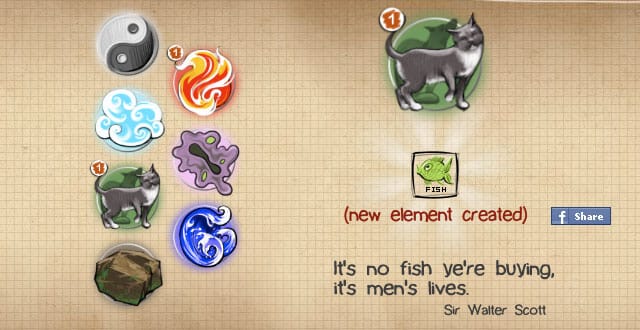Review: Doodle God

Doodle God wants to be a game about being God. Instead, it’s a game about being like a god. It answers the question: What if we had to do the work of God, but we didn’t possess the resources to do it? Sure, the game gives us resources, in the strictest sense of the word. We start with stone, air, fire, and water. When we combine them, we create for ourselves several more resources with which to create, well, other resources. That’s the game.
How do I, the doodle god, achieve victory? Create everything. The process is relatively simple. The various elements at your disposal are placed in different groups—humans, animals, plants, transportation, civilization—as you discover them. Match one element in a group to another element in another group. If all goes well, they make a new element. Combine earth and fire to make lava. Water and air make steam. Each time you create, you have more elements to work with. These are represented by static drawings, but they represent broad concepts, both abstract and concrete. Many elements bring to mind the inevitability of progress. Fire, the wheel, and a corpse: What couldn’t you create with these things? Theoretically, the possibilities are endless.
In actuality, though, the possibilities are startlingly limited, and seeking them out only results in a lot of frustrating trial and error. The wonderful rhythm of experiment and discovery in the early game quickly gives way to something far less inspiring. We, as doodle gods, simply run out of ideas, and must rely on the timed hints system to supply us with ideas. We have to wait for the game to show us, in its own time, two groups that contain two compatible elements. We wait; we beg for answers; we click in search of success. Click, click. Nothing. Click, click. Nothing. Click, click. Success. Wait. Beg. Click, click. Nothing. And so on.
This is not fitting behavior for a god. We should be in a state of constant creation, manipulation, and wonder at our own handiwork. Instead, we find ourselves mired in disillusionment and frustration. We are gods of a lesser caliber; we lack the omniscience, creativity, and patience to finish this task without help.
Doodle God could have been about the euphoric experience of being God—the feeling of limitless creation, and delight in the creation of good things. It’s a sensation we have in games like The Sims and Civilization. In contrast, Doodle God is a seemingly endless drudgery that only reminds us of the painful limitations of being human in a fallen world. Combine earth and fire to make lava. I just wish they would set the whole thing ablaze.




